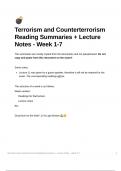Summary
Summary Security Studies - Lecture notes and mandatory reading summaries of Terrorism and Counterterrorism
- Course
- Institution
This document contains all the lecture notes and mandatory reading summaries for the course Terrorism and Counterterrorism.
[Show more]



